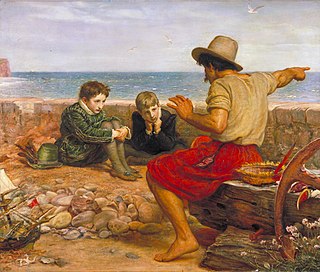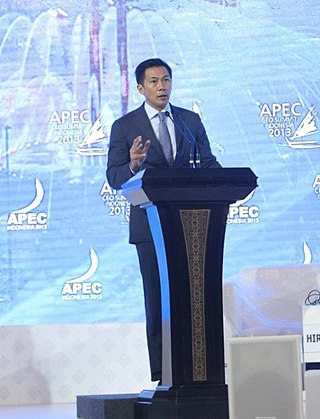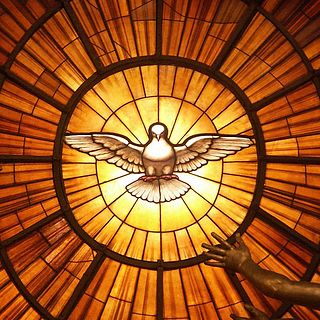
Glastonbury is a town and civil parish in Somerset, England, situated at a dry point on the low-lying Somerset Levels, 23 miles (37 km) south of Bristol. The town had a population of 8,932 in the 2011 census. Glastonbury is less than 1 mile (2 km) across the River Brue from Street, which is now larger than Glastonbury.

Storytelling is the social and cultural activity of sharing stories, sometimes with improvisation, theatrics or embellishment. Every culture has its own narratives, which are shared as a means of entertainment, education, cultural preservation or instilling moral values. Crucial elements of stories and storytelling include plot, characters and narrative point of view. The term "storytelling" can refer specifically to oral storytelling but also broadly to techniques used in other media to unfold or disclose the narrative of a story.

Leadership, is defined as the ability of an individual, group, or organization to "lead", influence, or guide other individuals, teams, or organizations.

Simple living refers to practices that promote simplicity in one's lifestyle. Common practices of simple living include reducing the number of possessions one owns, depending less on technology and services, and spending less money. In addition to such external changes, simple living also reflects a person's mindset and values. Simple living practices can be seen in history, religion, art, and economics.

Cohousing is an intentional, self-governing, cooperative community where residents live in private homes often clustered around shared space. The term originated in Denmark in the late 1960s. Families live in attached or single-family homes with traditional amenities, usually including a private kitchenette. As part of the communal orientation, shared spaces typically feature a common house, which may include a large kitchen and dining area, laundry, and recreational spaces. Walkways, open space, parking, playgrounds and gardens are common examples of shared outdoor spaces designed to promote social interactions. Neighbors also often share resources like tools, babysitting and creative skills.

An intentional community is a voluntary residential community designed to foster a high degree of social cohesion and teamwork. Members typically unite around shared values, beliefs, or a common vision, which may be political, religious, spiritual, or simply focused on the practical benefits of cooperation and mutual support. While some groups emphasise shared ideologies, others are centred on enhancing social connections, sharing resources, and creating meaningful relationships.
An organizational structure defines how activities such as task allocation, coordination, and supervision are directed toward the achievement of organizational aims.

Ella Josephine Baker was an African-American civil rights and human rights activist. She was a largely behind-the-scenes organizer whose career spanned more than five decades. In New York City and the South, she worked alongside some of the most noted civil rights leaders of the 20th century, including W. E. B. Du Bois, Thurgood Marshall, A. Philip Randolph, and Martin Luther King Jr. She also mentored many emerging activists, such as Diane Nash, Stokely Carmichael, and Bob Moses, as leaders in the Student Nonviolent Coordinating Committee (SNCC).
The Jesus Army, also known as the Jesus Fellowship Church and the Bugbrooke Community, was a neocharismatic evangelical Christian movement based in the United Kingdom, part of the British New Church Movement. The name Jesus Army was used specifically for the outreach and street-based evangelism for which they were known. The Jesus Fellowship was founded in 1969, when Noel Stanton (1926–2009), at that time the lay pastor of the Baptist chapel in the village of Bugbrooke near Northampton, East Midlands, was inspired by a charismatic experience which led him to successfully expand the congregation, largely by appealing to a younger generation of worshippers. As the new church grew and became more charismatic in nature, many of the original congregation left to continue worshipping in more traditional churches. The Jesus Fellowship grew considerably and by 2007 there were approximately 3,500 members in around 24 congregations in various cities and towns of the UK. The Jesus Fellowship frequently engaged in evangelism in public places, seeking through outreach to demonstrate the love of Jesus and the moving of the Holy Spirit. The Fellowship used various slogans, in its early days adopting "Love, Power & Sacrifice" and later "Jesus People, Loving People", and the name "Jesus Army". The church announced in May 2019 that it "will cease to exist and the current National Leadership Team will be stepping down from their roles once the winding up of the central Church has been completed". Members had voted on 26 May 2019 to revoke the Church's constitution, after a decline in membership to less than 1,000 following claims against its founder and two other then members of the church of a history of sexual assault during the 1970s. It was planned that the Jesus Centres charity the church created would continue to operate and that individual churches would become independent congregations. Fewer than 200 people were still living in communal households of the Jesus Fellowship. In October 2021, Companies House certified the change of name from Jesus Centres Trust (1165925) to JCT - Joining Communities Together Limited. Since December 2020, the Jesus Fellowship Community Trust has existed as a residuary body with the sole purpose of winding up the administrative affairs of the Jesus Fellowship Church.
The Latter Rain, also known as the New Order or the New Order of the Latter Rain, was a post-World War II movement within Pentecostal Christianity which remains controversial. The movement saw itself as a continuation of the restorationism of early Pentecostalism. The movement began with major revivals between 1948 and 1952 and became established as a large semi-organized movement by 1952. It continued into the 1960s. The movement had a profound impact on subsequent movements as its participants dispersed throughout the broader charismatic and Pentecostal movements beginning in the 1960s.

Paul Bowman Popenoe was an American marriage counselor, eugenicist and agricultural explorer. He was an influential advocate of the compulsory sterilization of mentally ill people and people with mental disabilities, and the father of marriage counseling in the United States.

The Catholic Charismatic Renewal (CCR) is a movement within the Catholic Church that is part of the wider charismatic movement across historic Christian churches.

In Christianity, worship is the act of attributing reverent honour and homage to God. In the New Testament, various words are used to refer to the term worship. One is proskuneo which means to bow down to God or kings.

People of Praise is a network of lay Christian intentional communities. As a parachurch apostolate, membership is open to any baptized Christian who affirms the Nicene Creed and agrees to the community's covenant. The majority of its members are Catholics, but Protestants can also join, reflecting the ecumenical nature of People of Praise. It has 22 branches in the United States, Canada, and the Caribbean, with approximately 1,700 members. It founded Trinity Schools, which are aligned with the philosophy of classical Christian education.
Community building is a field of practices directed toward the creation or enhancement of community among individuals within a regional area or with a common need or interest. It is often encompassed under the fields of community organizing, community organization, community work, and community development.

Cooperativeeconomics is a field of economics that incorporates cooperative studies and political economy toward the study and management of cooperatives.
The Word of God is an ecumenical, charismatic, missionary Christian community in Ann Arbor, Michigan. The community began in 1967.

Non-formal learning includes various structured learning situations which do not either have the level of curriculum, institutionalization, accreditation or certification associated with 'formal learning', but have more structure than that associated with 'informal learning', which typically take place naturally and spontaneously as part of other activities. These form the three styles of learning recognised and supported by the OECD.

The Sword of the Spirit is an international, ecumenical association of Christian communities within the charismatic movement. As of 2017, the Sword of the Spirit is composed of 82 communities, 45 of which are Catholic. The member communities are composed predominantly of laypersons. The Sword of the Spirit is one of the largest federated networks of communities to come out of the Catholic charismatic renewal.
Charismatic Christianity is a form of Christianity that emphasizes the work of the Holy Spirit and spiritual gifts as an everyday part of a believer's life. It has a global presence in the Christian community. Practitioners are often called charismatic Christians or renewalists. Although there is considerable overlap, charismatic Christianity is often categorized into three separate groups: Pentecostalism, the Charismatic movement, and the neo-charismatic movement.













